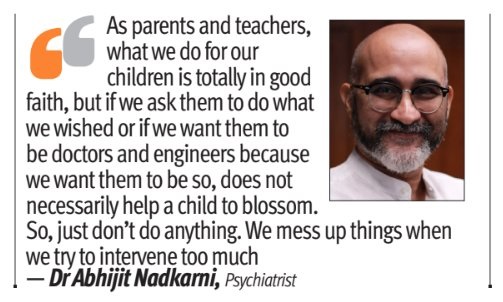PANAJI
“The best way to deal with today’s kids and adolescents is to offer them freedom and choice to explore their likes, interests and careers. Do not thrust your own ambitions on your children. Reduce the disconnect between what we are learning and what is required by the industry. We are losing a large chunk of youth to suicides, and we can change this totally by attitudinal shift, which needs time. Constant conversations are necessary to keep youth away from academic pressures, stressful family relations, disturbed relationships,” advised psychiatrist Dr Abhijit Nadkarni in an interactive session with Siddharth Mopkar at Ravindra Bhavan Margao on Saturday.
 Challenging traditional paradigms of success, and why is it not necessary for everyone to be a doctor – chatting on these lines with Dr Nadkarni, a psychiatrist, researcher and an academic, Siddharaj Mopkar of Vidyavriksh engaged the audience in the conversation in the third edition of ‘Seedlings of Success’ series where successful personalities share their secrete mantra to success with the audience.
Challenging traditional paradigms of success, and why is it not necessary for everyone to be a doctor – chatting on these lines with Dr Nadkarni, a psychiatrist, researcher and an academic, Siddharaj Mopkar of Vidyavriksh engaged the audience in the conversation in the third edition of ‘Seedlings of Success’ series where successful personalities share their secrete mantra to success with the audience.
Dr Nadkarni, a product of the London School of Hygiene and Tropical Medicine (LSHTM), UK completed his education at Goa Medical College before he went to London to postgraduate in Mental Health Services and transited to research and academics after being a practising psychiatrist.
Stating that the NEP (National Education Policy) is a good start, and a new tool given to old people without giving them skills and tips on how to use it. NEP is forward-thinking, but are we ready for it,” asked the doctor. “As parents and teachers, what we do for our children is totally in good faith, but if we ask them to do what we wished or if we want them to be doctors and engineers because we want them to be so, does not necessarily help a child to blossom. So, just don’t do anything. We mess up things when we try to intervene too much. Parents can only create an environment to learn, try out, experience and at the same time offer a safety net to their children to fall back to, whenever they need. Have open conversations with the children and let them express their views, even if they don’t match with your own,” said Dr Nadkarni.
Stating that parents must communicate with children in non-judgemental and empathetic manner, Dr Nadkarni emphasised that it is not important to rush to problem-solving. “Have open conversations, listen more and patiently, and do not be judgemental,” said the psychiatrist.
Calling today’s education system an industry, Dr Nadkarni asserted, “We must plant ideas in youth and let them decide, make mistakes and learn. Do not be demanding parents. Youth are going to take risks, that’s an evolutionary process, and brains are wired to take risks. We cannot stop it. If youth are turning towards addictions, be it drugs, alcohol, smoking or gadgets and devices, as parents, we must provide them with better information and have open interactions on the good and bad impacts of these habits. Do not keep them busy all the time, allow them to be bored. Getting bored is important because then they will find ways to keep themselves engaged and entertained.”
Devices are a part of life, and I am not anti-devices or technology, as it has advantages and disadvantages, said the researcher, adding it’s a social atrophy and cannot be entirely avoided. “We have to see that while using devices, our social skills are not compromised. Children need to go to school not only for educational purposes but to learn to behave, meet friends, and talk. Schools are for social development. Create an environment for children to learn at home, too. Give time to children, and let them ask questions. If you don’t know the answer, tell them you will find it out for them. And do not shame them for their ignorance. Teach them structural problem-solving and life skills, and develop the ability to critically analyse. Tell them, it’s okay to be wrong and okay to say, I don’t know. Smartphone addiction is a new addition and we, as doctors, are also learning how to cope with this issue,” admitted Dr Nadkarni.